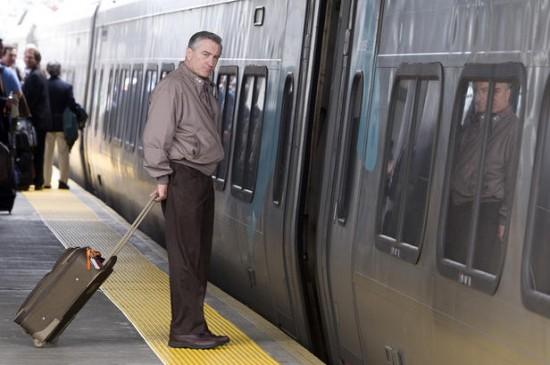Director: Kirk Jones
Starring: Robert De Niro, Drew Barrymore, Kate Beckinsale,Sam Rockwell
UK Release date: 26 February 2010
Certificate: 12A (99 mins)
The trailer for this film is provocative: ‘Sometimes the only way to get the truth is to go out and find it.’ Actually, that statement couldn’t be more truthful. This film makes you think ‘one day this could well be me’ – as a child dealing with an ageing parent and as a parent, dealing with your children who have grown away from you. Frank (Robert De Niro), recently widowed, invites his four children round to dinner. De Niro quickly becomes the father figure most viewers can identify with: warm, kind and realising that he hasn’t always been right, and desperately now wanting to do the right thing. But, having done the shopping and bought the best wine and steak, his children ring him one by one to give their excuses. Everybody is not fine, although Frank’s children do not want him to know what is really going on.
Frank begins the journey of calling upon them one by one and not telling them he is coming. On his way to see David, his artist son in New York, we see him embark on the first of a series of long train and coach journeys. It’s on these journeys that the reality of his life is shared with strangers. We learn that he worked with telephone lines, the bold irony being that communication is his family’s biggest problem. These lines become an essential metaphor throughout the film; conversations are had amongst three of the children about Frank and we learn the real story about David through them. As Frank reflects, the lines were ‘his work’ (his day job while the children were growing up) – he put the PVC coating on them but those closest to him can’t use the connection the lines provide to be honest to him.
David is not at his flat, Frank leaves a note, and catches sight of a striking watercolour by David in the gallery next door. He continues on to Chicago to see his daughter Amy (Kate Beckinsale), ‘high up in advertising’, only to be greeted by her son, Jack: ‘I’m online’. De Niro, this time everybody’s granddad, replies: ‘Ok, you do your thing’, in the most understanding of ways – don’t we all just take our grandparents for granted and then regret all the lost time with them? He can’t stay long at Amy’s: she has to fly to see David in prison in Mexico – of which Frank knows nothing – and makes some other excuse.
Frank does not exchange any deep words with Amy, but his sadness at the station when he leaves is easy to see. De Niro has a truly expressive face and is superbly natural emotionally – it’s easy to forget he’s acting. He journeys on to Denver to see Robert (the very convincing Sam Rockwell), whom he believes to be a conductor but in fact learns is ‘only’ a timpanist. Robert hints that dad always expected too much: he saw his children in certain careers and is now struggling to see them as life has turned out. But the film is too intelligent to lay the blame for lack of communication and lost dreams on Frank; he is simply the parent who wanted the very best for his children, felt he never really knew them as they only talked to their mother, and now realises that most of the time things don’t work out as planned. Robert sees this and they part (Robert again making excuses as to why he can’t spend time with him) on good terms, with Rockwell looking on, conveying all too well the realisation that parents get old and the time you had with them will never come again.
Frank’s final stop is Rosie (Drew Barrymore), a dancer in Las Vegas. On the way, there is a heartbreaking scene in the subway when Frank gives some money to a seemingly homeless young man, only for this to backfire and his medication is stamped on and destroyed. De Niro, by now showing signs of hurt after his rejection from his children, conveys the vulnerability of age and loneliness. But he is determined and is cheered, temporarily, on arrival in Vegas to see Rosie flourishing in the dancing career she dreamed of, with a lovely apartment and a mysterious baby who she tells Frank is her friend’s. Rosie, out of all the children, is the one who most relishes the time with her dad and it is Frank who takes an early exit and must return home to re-stock on his medication.
One of the most poignant devices in the film is the use of flashback. When Frank sees each of his children for the first time, he first sees them as the children they once were. Then suddenly they are the successful adults they have become but with the baggage this has brought. By the time Frank leaves to go home it is clear that all is not well for him and (beware of a spoiler alert if you read on!) he doesn’t make it home, but instead has a heart attack on the plane and finally, in his hour of need, the children are at his bedside when he wakes to tell him about David. The news is worse than he could ever have imagined.
The film is not sentimental or overdone in any way. The performances are grounded and real, and you feel that this is how things are for many a family. It is De Niro’s film, however, and he doesn’t make it hard for us to have empathy with him as dad, granddad, widower and man suddenly feeling he has lost touch. The ironies are bold, perhaps too bold some would say – the telephone wires he has been a part of and which now don’t offer comfort or honesty, the fact that his children all work in the creative and ‘communication’ industries but tell him little – but these ironies are used well and make a seemingly light-hearted film very meaningful and all too realistic. Maybe it is the younger generation who have lost touch with their elders, not vice versa.
Anna Wheeler
![]() Visit this film's official web site
Visit this film's official web site






